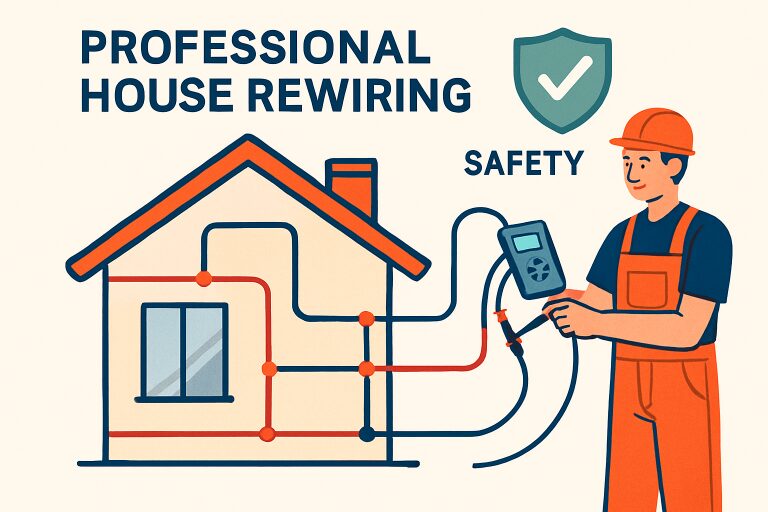Key Takeaways
- Outdated wiring is a leading cause of house fires and electrical hazards.
- Hiring licensed professionals guarantees safety, code compliance, and long-term efficiency improvements.
- Investing in rewiring can increase property value and reduce overall home maintenance costs.
Table of Contents
- Signs Your Home Needs Rewiring
- Benefits of Professional Rewiring
- DIY vs. Professional Rewiring
- Cost Considerations
- Choosing the Right Electrician
- Conclusion
Modern homes depend on safe and reliable electrical systems, yet many homeowners overlook the importance of maintaining up-to-date wiring. Whether you own an older house or plan to update your living space, ensuring your home’s wiring meets current standards is essential for protecting your family and property. For instance, Columbia, SC house rewiring services by licensed electricians offer peace of mind by safeguarding your home against common electrical hazards.
Outdated or faulty wiring can lead to serious issues such as power outages, appliance damage, and fires. Professional house rewiring services address these risks directly, improving your home’s safety and efficiency. Updating your electrical system isn’t just about preventing danger—it’s also about maximizing comfort and the value of your investment.
Many houses built decades ago were not designed to accommodate modern electrical demands, such as high-powered appliances, smart home devices, and contemporary entertainment systems. Professional electricians can upgrade your wiring to meet today’s standards and prepare your home for future needs. If you’re unsure about the condition of your electrical system, having a qualified professional inspect your wiring is a wise first step.
Knowing when and why to rewire can be confusing without specialized knowledge. This article details the signs your home may need rewiring, the significant benefits of professional services, and why hiring qualified experts is key to safety and compliance. Understanding these essentials enables you to make informed decisions about your home’s electrical health.
Signs Your Home Needs Rewiring
Recognizing when your house may require rewiring helps prevent significant hazards. Some common warning signs include:
- Frequent circuit breaker trips: Constantly resetting breakers can indicate overloaded circuits or compromised wires.
- Flickering or dimming lights suggest inconsistent power flow or failing connections, often caused by aged wiring.
- Warm or discolored outlets: Overheating at outlets might mean wires are deteriorating, risking short circuits or fire.
- Burning smells or sparks: Unexplained odors or sparks from switches or outlets are urgent red flags for electrical problems.
If you notice any of these issues, experts recommend inspecting your wiring immediately to avoid emergencies.

Benefits of Professional Rewiring
Opting for professional rewiring goes beyond safety. Upgrading your home’s wiring system brings a multitude of long-term advantages:
- High-level protection: New, code-compliant wiring dramatically reduces the chance of electrical fires or shock incidents.
- Boosted home value: Modern electrical systems appeal to buyers and can significantly increase your property’s resale value.
- Lower utility bills: Improved wiring prevents power loss and improves support for energy-efficient appliances.
- Adaptation for modern lifestyles: More outlets, better capacity, and smart-home readiness prepare your house for current and future technology needs.
Additionally, updated electrical systems can lower homeowners’ insurance premiums due to increased safety ratings.
DIY vs. Professional Rewiring
Some homeowners may be tempted to tackle rewiring projects independently to save money, but this approach carries significant risks. Electrical work is intricate and demands specialized knowledge and equipment. Mistakes can lead to code violations, persistent hazards, and voided insurance policies. Sometimes, DIY work that fails to meet local codes may make selling your home more difficult.
Licensed electricians not only ensure safe and thorough rewiring, but they also document the work to meet municipal codes and pass inspections. This professional oversight guarantees your project’s quality while saving you from expensive and dangerous errors.
Cost Considerations
The price of professional rewiring varies depending on the size of your home, its age, accessibility of the wiring, and your specific needs. While the initial investment can range from a few thousand dollars and up, the long-term benefits—reduced utility bills, higher property value, and fewer repairs—make it a valuable improvement, especially in homes older than 40 years. Professionally rewired homes are typically more attractive to buyers and have fewer insurance claims, which can save money over time.
Choosing the Right Electrician
Finding the best professional for your rewiring project is crucial. Here are steps for selecting a qualified electrician:
- Verify licensing and insurance: Ensure your electrician is fully certified and insured in your locality.
- Check references and online reviews: Genuine feedback from previous clients can help you gauge the electrician’s reliability and expertise.
- Obtain multiple quotes: Competitive estimates help you understand the market rate and scope of work involved.
- Discuss project details up front: Clarity about the process, timeline, and materials reduces the risk of confusion or hidden costs.
Don’t hesitate to ask about the electrician’s experience with similar projects. This can provide added peace of mind in your selection process.
Conclusion
Upgrading your home’s wiring with professional house rewiring services is essential to creating a safer, more efficient, and more valuable property. Homeowners protect their families, investments, and peace of mind by promptly addressing warning signs and choosing skilled, licensed electricians. Proactive maintenance today ensures reliability, convenience, and safety for years to come.
